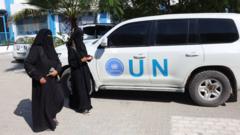The aid-dependent population in Gaza perceives the recent legislative ban by Israel on the UN Relief and Works Agency (UNRWA) as a dire threat to their already fragile humanitarian situation. Residents like Yasmine el-Ashry in Khan Younis articulate the urgency of the matter, saying, “Unrwa means everything to us: it is our life, our food, our drink and our medical care. When it closes, there will be no flour. If my son gets sick, where will I go?” This sentiment echoes across Gaza, where the deepening crisis leaves many fearing their survival.
The Israeli parliament has shown significant support for legislation that prevents Israeli officials from engaging with Unrwa, as it faces allegations of complicity with Hamas. Opposition figure Sharren Haskel claims the agency has been overtaken by a terrorist organization, stating, “If the United Nations is not willing to clean this organisation from terrorism, then we have to take measures to make sure they cannot harm our people ever again.” Unrwa, however, insists on its neutrality and has warned that the impending Israeli laws would severely hinder its ability to operate.
Sam Rose, Deputy Director for Unrwa in Gaza, described the repercussions, asserting, “It would essentially make it impossible for us to operate in Gaza.” The ban would restrict the agency's ability to deliver supplies and provide vital services to the hundreds of thousands of Palestinians who rely on its support.
Despite warnings from international diplomats regarding the potential fallout of such actions, domestic politics in Israel have prioritized these legislative moves. Unrwa, established in 1949 to assist Palestinian refugees, reportedly now supports around six million individuals across various regions, including Gaza, the West Bank, and neighboring countries.
The agency has been the subject of scrutiny, especially after allegations surfaced involving staff participation in Hamas’s recent assaults. Unrwa confirmed that a Hamas commander had been a staff member since 2022 but insists on swiftly addressing allegations of any wrongdoing by its employees. Critics of the agency argue its existence perpetuates the refugee dilemma that lies at the heart of the Israel-Palestinian conflict.
As residents of Gaza grapple with the lack of essentials like food and water, the legislative shift further deepens their fears. Mohammed Salman from Deir al-Balah expressed concern that the very identity of Palestinians as refugees is under threat, stating, “They do not want the word refugee. Israel is looking for this.” The mounting pressure on Unrwa raises serious alarms about the future for millions who depend on its services in a region already beset by conflict and instability.
The Israeli parliament has shown significant support for legislation that prevents Israeli officials from engaging with Unrwa, as it faces allegations of complicity with Hamas. Opposition figure Sharren Haskel claims the agency has been overtaken by a terrorist organization, stating, “If the United Nations is not willing to clean this organisation from terrorism, then we have to take measures to make sure they cannot harm our people ever again.” Unrwa, however, insists on its neutrality and has warned that the impending Israeli laws would severely hinder its ability to operate.
Sam Rose, Deputy Director for Unrwa in Gaza, described the repercussions, asserting, “It would essentially make it impossible for us to operate in Gaza.” The ban would restrict the agency's ability to deliver supplies and provide vital services to the hundreds of thousands of Palestinians who rely on its support.
Despite warnings from international diplomats regarding the potential fallout of such actions, domestic politics in Israel have prioritized these legislative moves. Unrwa, established in 1949 to assist Palestinian refugees, reportedly now supports around six million individuals across various regions, including Gaza, the West Bank, and neighboring countries.
The agency has been the subject of scrutiny, especially after allegations surfaced involving staff participation in Hamas’s recent assaults. Unrwa confirmed that a Hamas commander had been a staff member since 2022 but insists on swiftly addressing allegations of any wrongdoing by its employees. Critics of the agency argue its existence perpetuates the refugee dilemma that lies at the heart of the Israel-Palestinian conflict.
As residents of Gaza grapple with the lack of essentials like food and water, the legislative shift further deepens their fears. Mohammed Salman from Deir al-Balah expressed concern that the very identity of Palestinians as refugees is under threat, stating, “They do not want the word refugee. Israel is looking for this.” The mounting pressure on Unrwa raises serious alarms about the future for millions who depend on its services in a region already beset by conflict and instability.
















